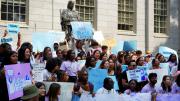Two days after the U.S. Supreme Court banned race-conscious affirmative action in higher education admissions, Harvard Yard transformed into a rallying ground. Led by the Coalition for a Diverse Harvard, more than 100 students, alumni, and members of the public united in opposition to the decision, gathered at the John Harvard statue and marched to the Science Center Plaza, to the Smith Campus Center, and back. As some organizers distributed pins and purple t-shirts reading “Our Unity is Our Strength, Our Diversity is Our Power,” others encouraged attendees to sign table-length posters in support of the protest.
Between chants of “Diversity is under attack!” and “Edward Blum, what are you on? Asian students are not your pawns!” speakers at the Saturday rally asserted that affirmative action practices are necessary to foster a diverse student body and to redress historical inequality. “Affirmative action affirms and sees our story as a framework for passions, ambitions, and achievements,” Michelle Jean-Louis ’26 told demonstrators. “The decision might have been made, but the fight for visibility must remain.”
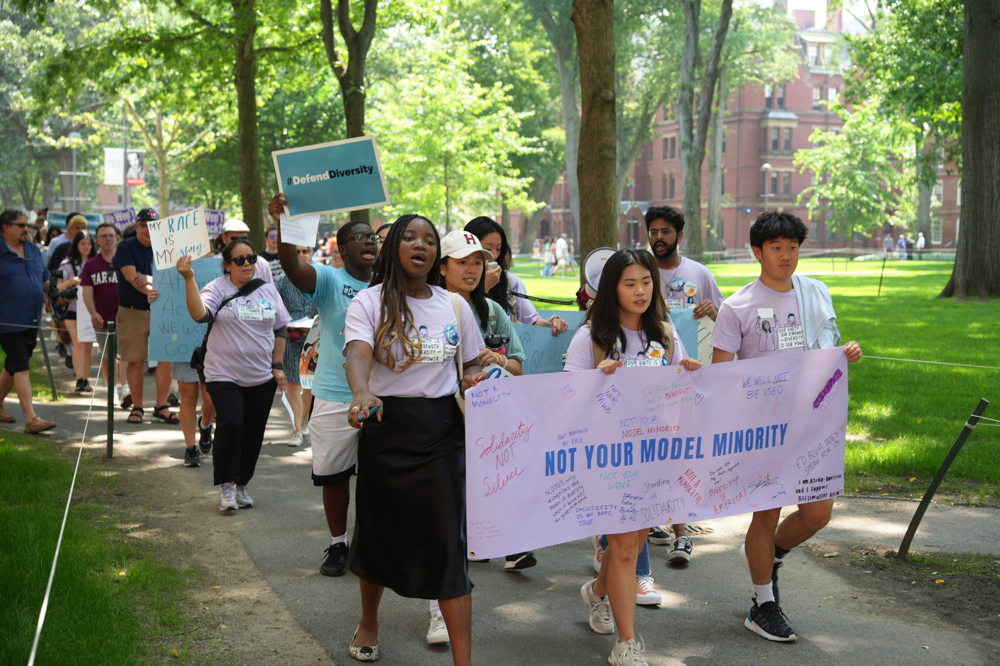
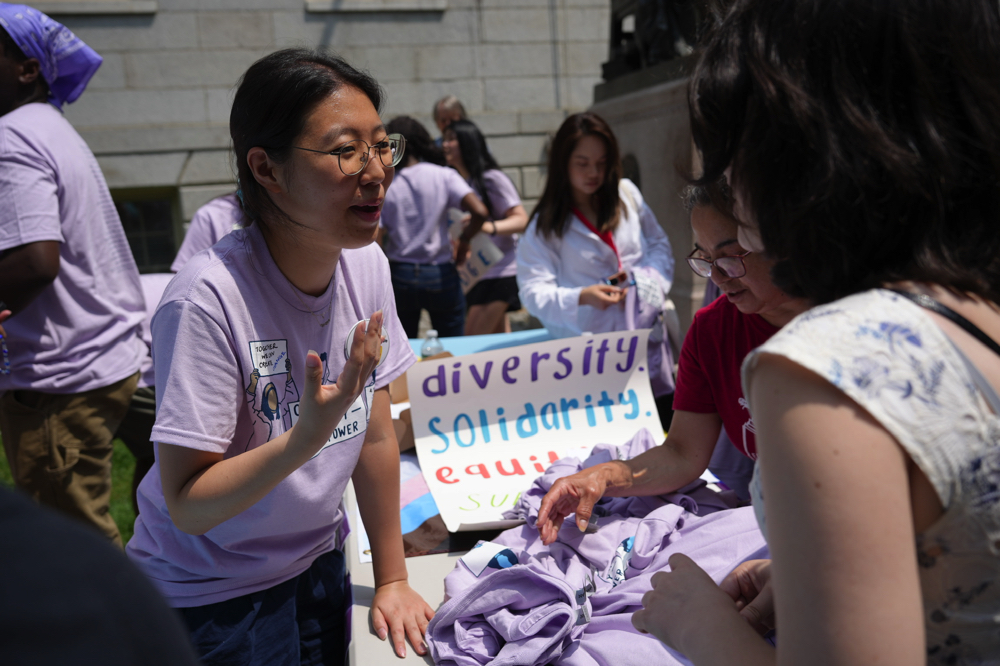
Students, alumni, and members of the public turned out in force at the rally.
Photographs by Ryan Doan-Nguyen
The Supreme Court’s decision on June 29th declared the consideration of race in admissions at Harvard and the University of North Carolina unconstitutional, upending decades of precedent that allowed colleges to provide special consideration to underrepresented racial minorities and historically excluded groups. Students for Fair Admissions (SFFA), the conservative petitioner in the case, claimed that these policies discriminated against white and Asian American applicants; its founder, Edward Blum, characterized the lawsuits in a May press release as “rescue missions for the colorblind legal principles that hold together Americans of all races and ethnicities.” In her Saturday speech, Zoha Ibrahim ’26 criticized this push for a “colorblind” perspective of the Constitution: “When the Supreme Court declared on Thursday that educational diversity was a commendable goal, but one that needed a colorblind interpretation of the law, they painted a vision of an America that does not exist.”
Throughout the case, Harvard students have emerged in resolute, vocal opposition to SFFA. Last July, 25 student and alumni organizations represented by the NAACP Legal Defense Fund filed an amicus brief in support of Harvard’s practices. In October, the student-led Harvard Affirmative Action Coalition coordinated a pro-affirmative action “teach-in” that drew 300 students and a “Week of Action” with an open-mic event, town hall, and rally along Massachusetts Avenue. That same month, dozens of undergraduates and some graduate students boarded a midnight bus to Washington, D.C. to protest as justices heard oral arguments for the pair of lawsuits. Students have penned op-eds for national publications, appeared in documentaries, and testified. Without affirmative action and diversity, they say, campuses will suffer.
During her speech on Saturday, Eleanor Craig—the administrative and program director for Harvard’s Committee on Ethnicity, Migration, Rights—lauded these efforts and offered reassurance that they weren’t made in vain. “At a time in life when no one would have faulted you for blocking this out and working to secure your own future, you chose to fight for the futures of others,” she said. “The coalition you have built—the momentum—will endure forever toward equity at Harvard, in higher education, and far beyond.”
Statements from campus organizations representing diverse racial, ethnic, religious, and LGBTQ+ identities flooded social media platforms and email lists in the aftermath of the ruling: “The elimination of race in race-conscious admissions is an erasure of our stories, contributions, and selves,” the Harvard Black Students Association’s statement read; the Harvard-Radcliffe Asian American Women’s Association wrote that the Court’s ruling reveals “their lack of commitment to a more just society” and “their role in upholding racial hierarchies and stereotypes”; and the Institute of Politics’ Student Advisory Committee called it “challenging and, for many of us, deeply disappointing.” On Friday, more than 15 student affinity groups cohosted a virtual “community conversation,” where students shared personal stories about their racial identities and the concerns they have for the future of college admissions.
“This is something that has sent shockwaves throughout the entire world—in the U.S. specifically, and throughout my community as well,” Agustín León-Sáenz ’25 said in an interview at Saturday’s rally. León-Sáenz, who hails from New Mexico and believes he’s the only Ecuadorian in his Harvard class, described as a “myth” the view that affirmative action “gives an unfair advantage to black and brown students, specifically on the basis of race.” “Admissions has never been about that,” he said. “It has always been holistic” and in service of combatting “systemic issues like schools’ resources, donations, and college admissions counselors.”
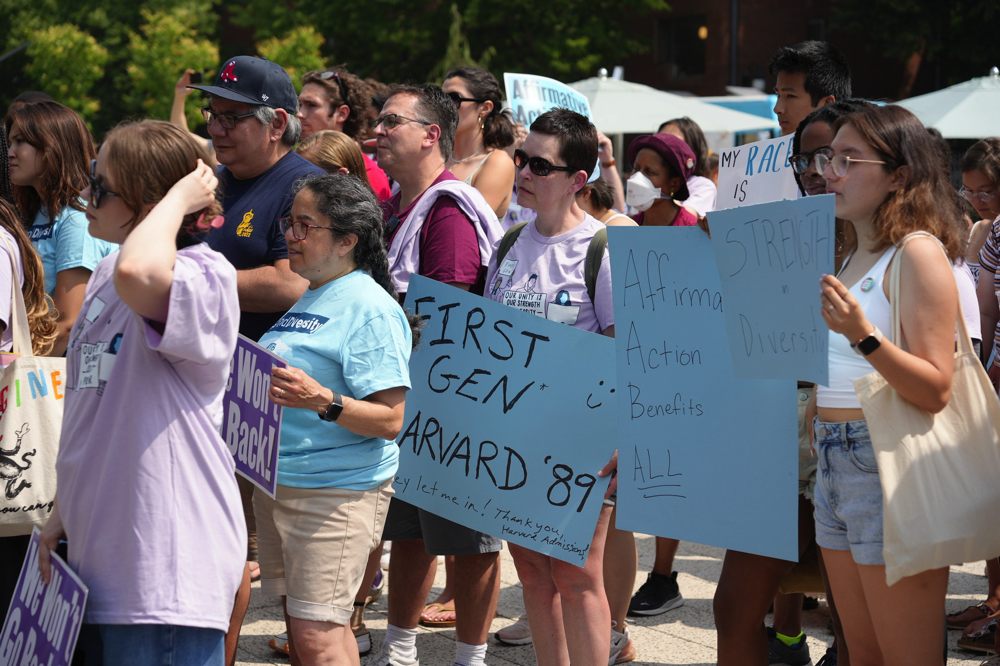
Alumni joined current students in protest.
Photograph by Ryan Doan-Nguyen
Several speakers on Saturday emphasized the existence of continuing racial disparities in the United States. “Despite what the Supreme Court thinks, minority groups in America have, and will always be at a disadvantage, regardless of their economic status,” Sydney Wiredu ’26 told the crowd. He added, “Students in inner-city schools and low-income zip codes, who tend to be of a racial minority group, are now being sent a chilling message that they don’t belong at prestigious universities like Harvard.”
Others spoke about media narratives surrounding Asian Americans. Kathryn Kyomitmaitee ’26, who serves as cultural cochair of the Harvard-Radcliffe Asian American Association, said in an interview that her Thai heritage has made her realize that “many people lump Asian Americans into one category and disregard how diverse all the different subgroups are—central, South, Southeast, East, etc...”
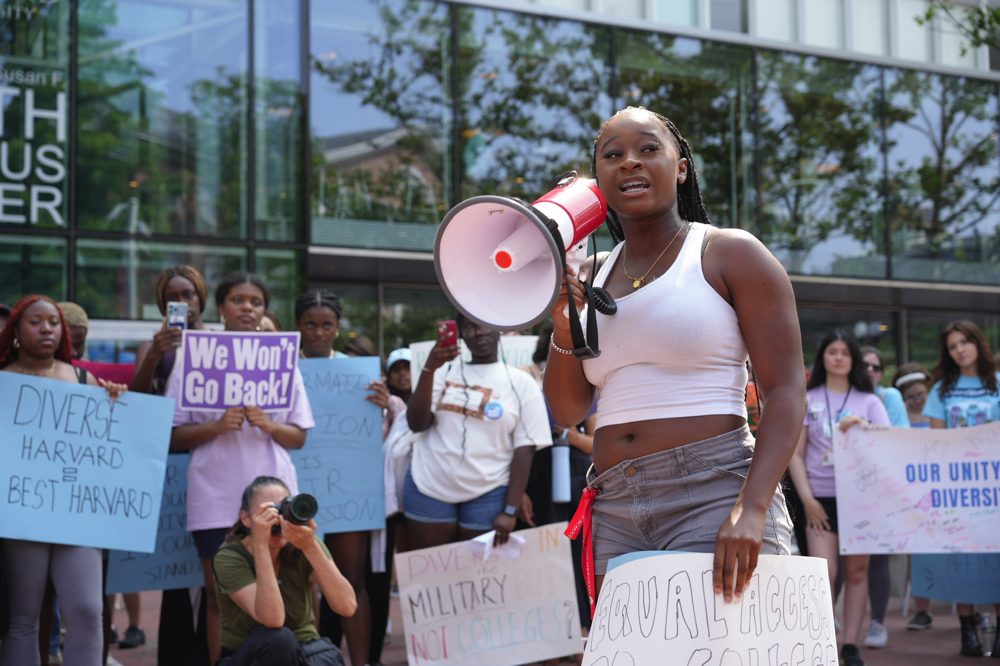
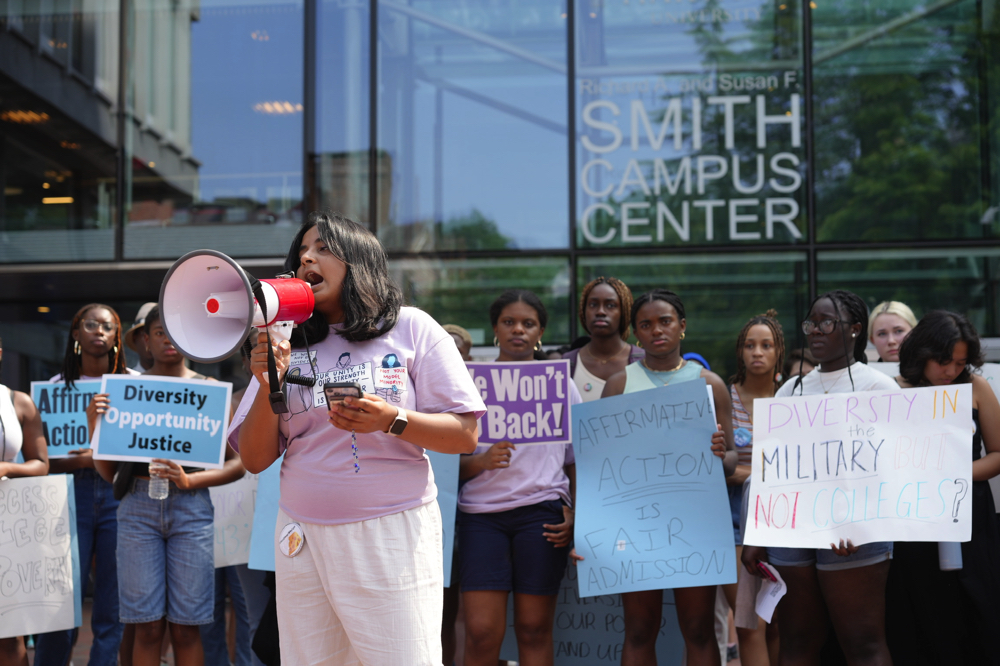
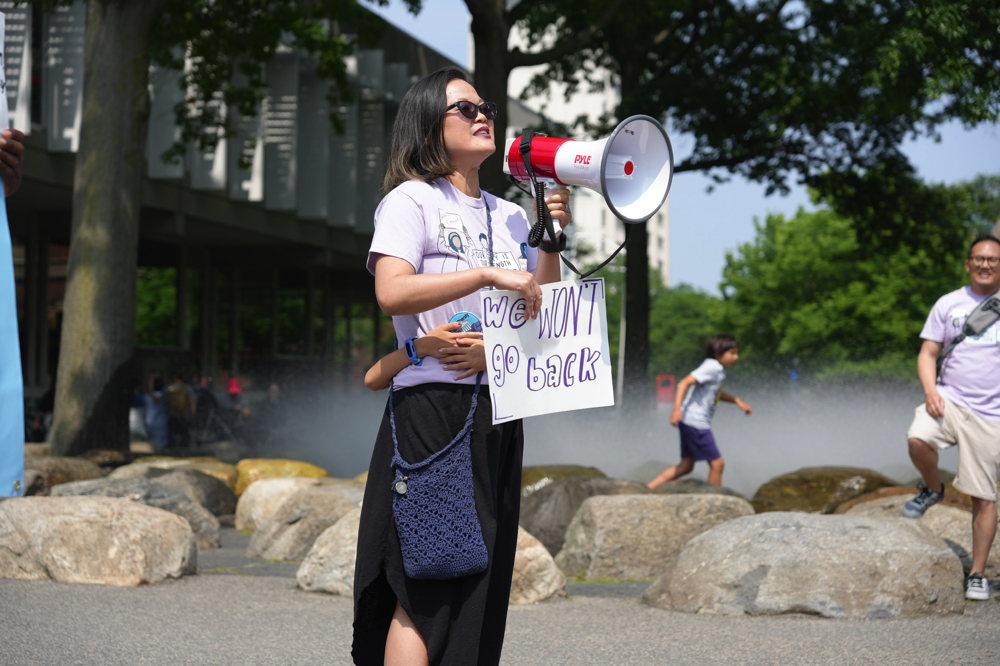
From top: “This is just so sad and disappointing because my dream is to go to this school,” said Anessa Andrews, a high school student enrolled in Harvard's Summer School; Zoha Ibrahim ’26; OiYan Poon, hugged by her daughter
Photographs by Ryan Doan-Nguyen
OiYan Poon, an associate professor at Colorado State University who researches affirmative action policies and Asian American education, told protestors that although campaigns have depicted Asian Americans as opponents of affirmative action, the majority of registered Asian American voters support the policy “because we came here as migrants, diasporic refugees, for opportunity. We didn’t come here to take anything away from anyone. We came here to share and contribute.” She continued, “I will not stand here and say this is a win for my community when we all lose.”
Some speakers denounced SFFA as an organization that “pits people of color against each other” with a “white supremacist agenda,” in the words of Rebecca Zhang ’26, an intern for the Coalition for a Diverse Harvard. “I will not remain silent,” she said on Saturday, “as they try to use Asian Americans as a racial wedge, or their model minority.”
During speeches at the Smith Campus Center, a man positioned himself in the center of the crowd and heckled the speakers, shouting that the crowd had been paid to protest. Demonstrators reacted with a volley of boos and chants and by raising their signs in his face. Some organizers chased him away from the crowd. “These people—they’re bused in from out-of-state, and they’re paid,” the man, who did not want to be named, told Harvard Magazine. “They’re pretending that they’re speaking for everybody else.”
Jean-Claude Pierre Jr., along with other members of the public, spontaneously joined the rally. Near its conclusion, Pierre took the microphone to share his perspective as a Black parent whose daughter had been accepted to Yale. “We shared the news with everyone, and I’ll never forget, like it was yesterday, to one of my neighbors, I said, ‘Can you believe my daughter, Jasmine, she made it to Yale?’ You know what his response was? ‘Oh, because she’s Black,’” he told the crowd. “But guess what, ladies and gentlemen? In May 2020, she graduated magna cum laude from medical school at Columbia.”
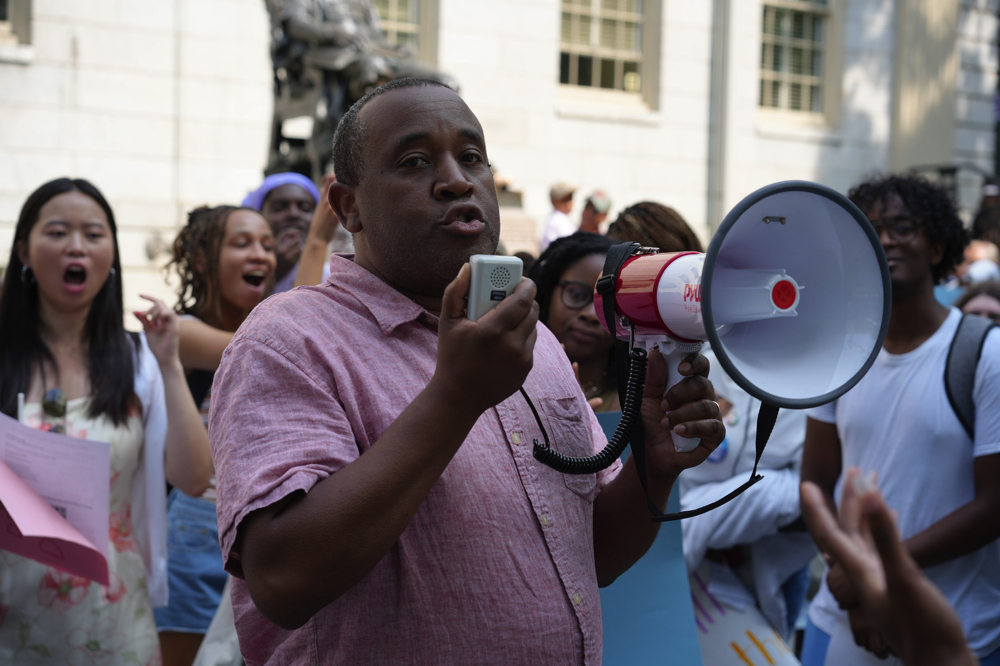
Jean-Claude Pierre Jr.
Photograph by Ryan Doan-Nguyen
Pierre, visiting from Long Island, New York, expressed in a post-rally interview that his participation was driven by the potential impact of the ruling on his son, a rising high school senior. “My son statistically has no issue. The first time he took his SAT, he got a 1550. He’s a full point plus,” Pierre said. “And yet, his first reaction [to the ruling] was, ‘I don’t know if I’m still going to apply to Harvard anymore because it’s just going to be less of us around.’”
Looking ahead, student activists are transitioning from fighting to preserve affirmative action to minimizing the impact of the Supreme Court's decision to dismantle it. In an interview Saturday, León-Sáenz said that he hopes “Harvard tries to do more than enough to beat the predictions” of lower minority enrollment. In an email following the rally, co-leader of the Harvard Affirmative Action Coalition and Coalition for a Diverse Harvard intern Muskaan Arshad ’25 wrote that “People from a plethora of organizations representing Asian American, Black, Latine, and Indigenous students have united to collectively mobilize for affirmative action, emphasizing the multiracial solidarity of our activism.” For the future, she added, “we’re working on ways to mitigate the impact of the case, specifically targeting the unfair usage of legacy admissions.”
